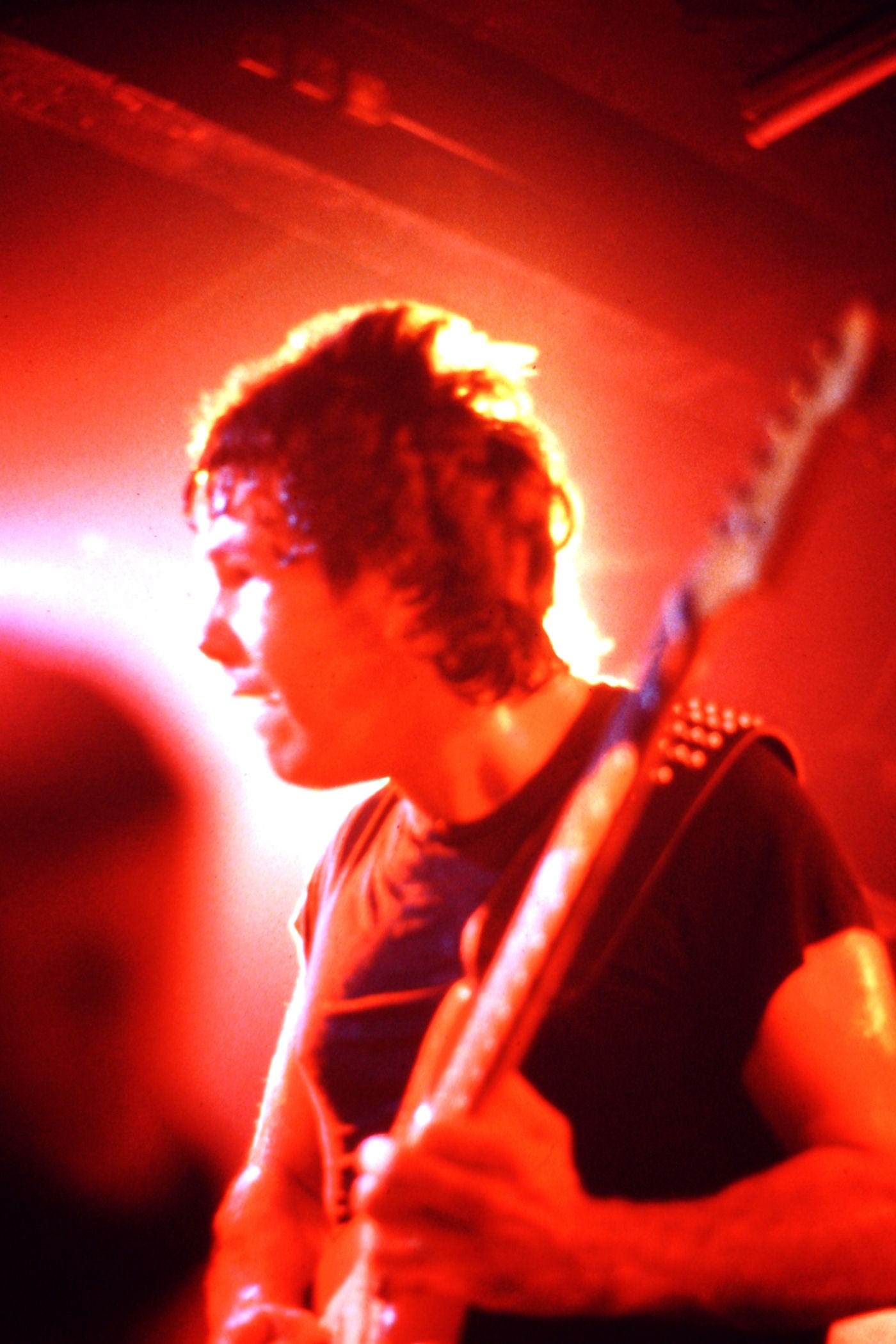(Guitar) Heroes Never Die
Have you heard about Cuchulainn? He was a kind of guitar hero of his day, running around cutting people’s heads off!
Gary Moore1
In 2020, during that interminable, soul-sapping period of house arrest known as lockdown, I started work on two book projects.
One was about charismatic warlords of the Ancient World. Not the usual suspects: no dazzling Caesar or psychopathic Alexander. Other great and terrible men, heroic and courageous, tyrannical and cruel; the perfect characters for a boy’s own foray into the fields of glory. History as high adventure! A belated sequel to, and improvement on, For the Glory of Rome… It did not progress beyond an outline and some rough character sketches.
The other project concerned guitar gods and heroes. Visitors to Flickr soon become aware of my devotion to certain doyens of heavy guitar. The book concept was an examination of the charisma, greatness and failings of my favourite guitarists, categorized as gods, demigods and heroes. Exemplars of virtus and gloria. No strangers to hubris.
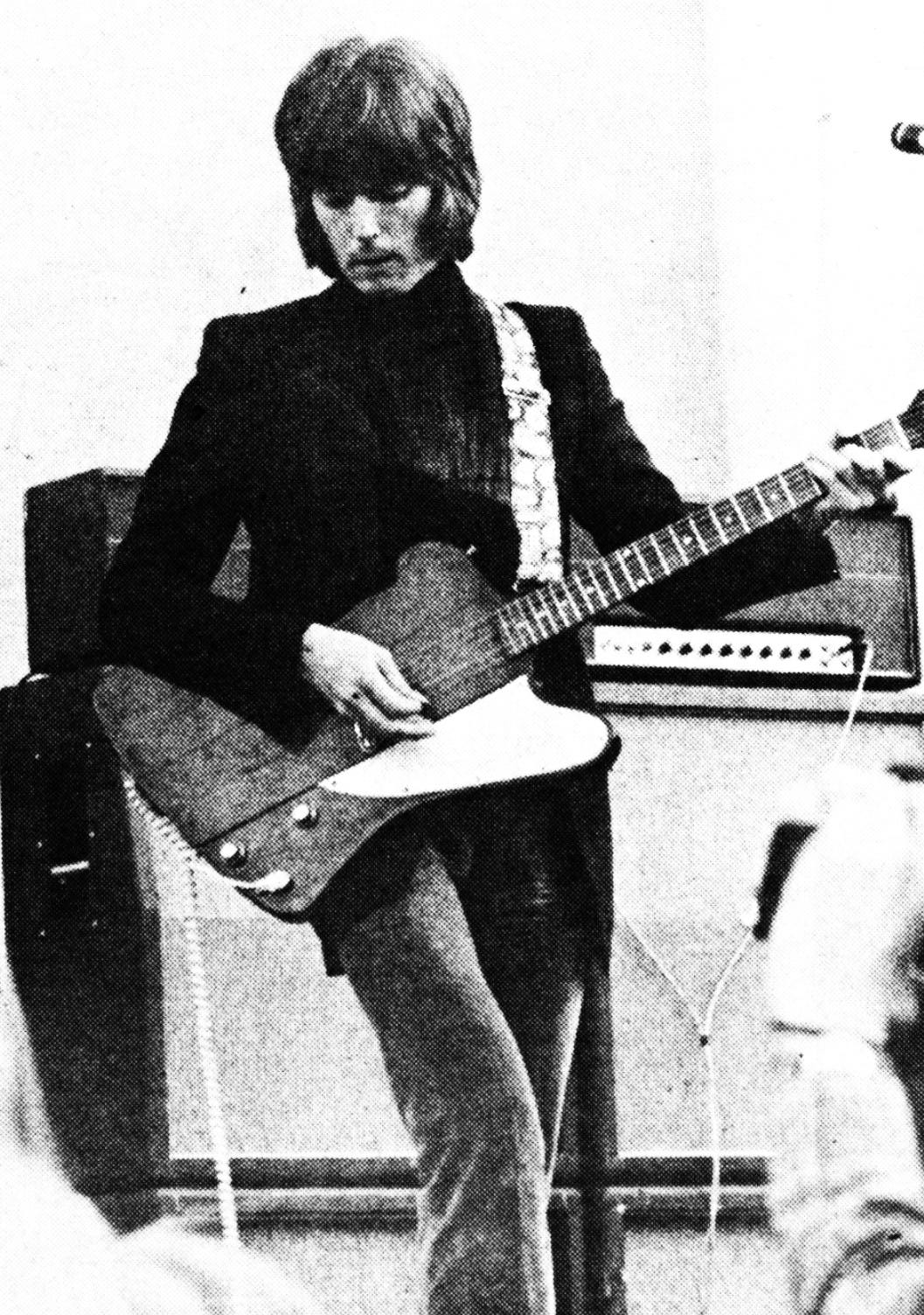
The gods: Eric Clapton (‘66-‘68), Ritchie Blackmore, Michael Schenker, Uli Jon Roth and Randy Rhoads. The demigods: Leslie West, Tony Iommi, Angus Young, Gary Moore, John Sykes, the dioscuri of Lizzy, Priest and Maiden. The heroes: Eric Bell, Tommy Bolin, Dave Meniketti, Vivian Campbell, Slash, Doug Aldrich, Laurence Archer, Søren Andersen, the Hawkins brothers and Richie Faulkner.

There would be necessary discussion of the great innovators (Beck, Townshend, Hendrix, Page and Van Halen), numerous honourable mentions and cameos, and appendices about gear and trivia (the most metal guitar? Adrian Smith’s black Lado Earth as featured in the ‘Aces High’ video, obviously).
The project did not progress beyond an outline and the acquisition of a pile of vintage guitar magazines.
Man has got to know his limitations, as Dave Mustaine (channeling Clint Eastwood) might say. This mediocre, self-taught bedroom guitarist quickly realised he lacked the necessary musical knowledge and vocabularly. Kerrang-ese like ‘riffage’, ‘shredding’, ‘tasty licks’, ‘fretboard heroics’ and ‘blazing/blistering/searing/soaring solo’ can carry one only so far. Anyhoo, the job had already been done by the expert contributors to the Alchemy profiles at Dinosaur Rock Guitar. Also, the age of the guitar hero is waning.
Too many bands look and sound the same. Guitarists go to college and spend two years learning how to play, but you can’t tell them apart. Back in the seventies, Tony Iommi, Ritchie Blackmore and myself all had strong individual sounds. It was the sum of each musician that gave the bands their different flavours. Unfortunately, I don’t really see and hear that any more.
Mick Box2

I’m fascinated by certain guitar heroes. It feels like they aren’t as big a deal these days, compared to when you had people like Tony Iommi or my dad, Dave Murray and Adrian Smith. It’s disappearing a bit.
Dylan Gers, son of Janick3
The true guitar hero is an increasingly rare and aged beast. He is the product of a distant epoch, a twentieth century boy who, unlike the youthful legion of technically brilliant but characterless Insta supershredders, mastered his art in the testing conditions of the pre-internet era and before the mass expansion of music colleges. There may be some riffs left to discover but he already has the best ones.
And yet…
The subject retains its appeal, especially investigating the psychology of the lords of rock and metal. The unwilling, the insecure and self-sabotaging; the complacent virtuosos and the mercurial maestros; the self-conscious introverts and the extrovert egomaniacs; the complex personalities and the rounded characters.

Pound for pound, he’s one of the best soloists in history, but he's such a dick that he'll probably never get the credit he deserves.
Guitar hero Billy Corgan opines on guitar god Ritchie Blackmore.4
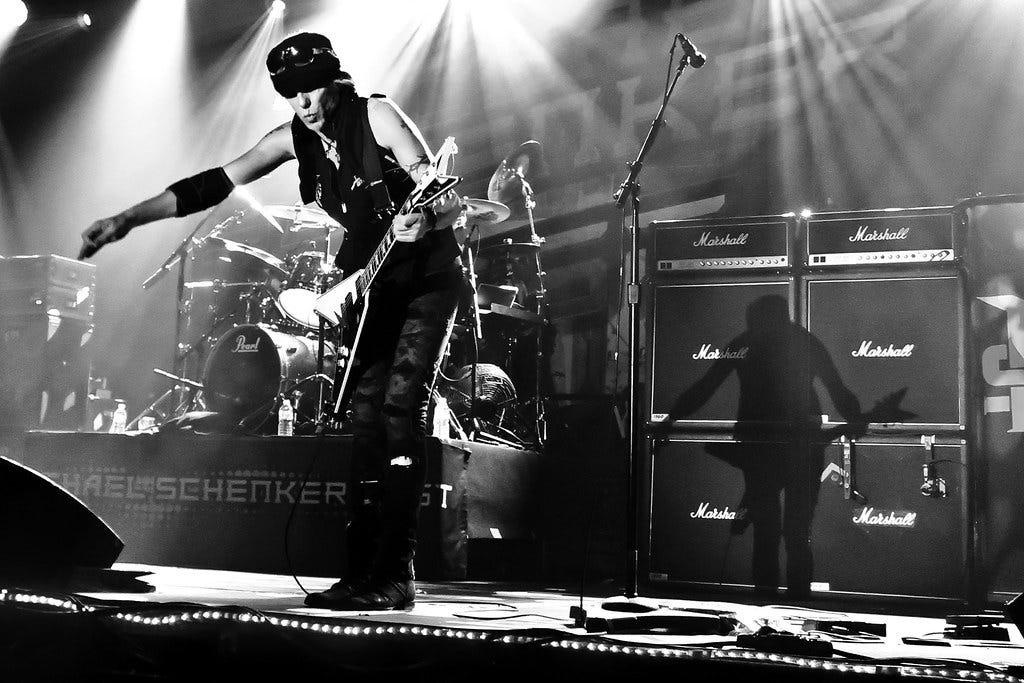
I got used to the image of being a guitar hero — after all, it was my aim when I was young — but I got angry when people said, "Michael Schenker is God", because I was very sensitive about those things.
Michael Schenker5
Wunderkind, loner and alcoholic. An enthusiastic participant in a one-sided rivalry with an older, more successful sibling. Known by the unflattering, but not entirely undeserved, sobriquet ‘Mad Mikey’. Schenker, despite it all, has endured.
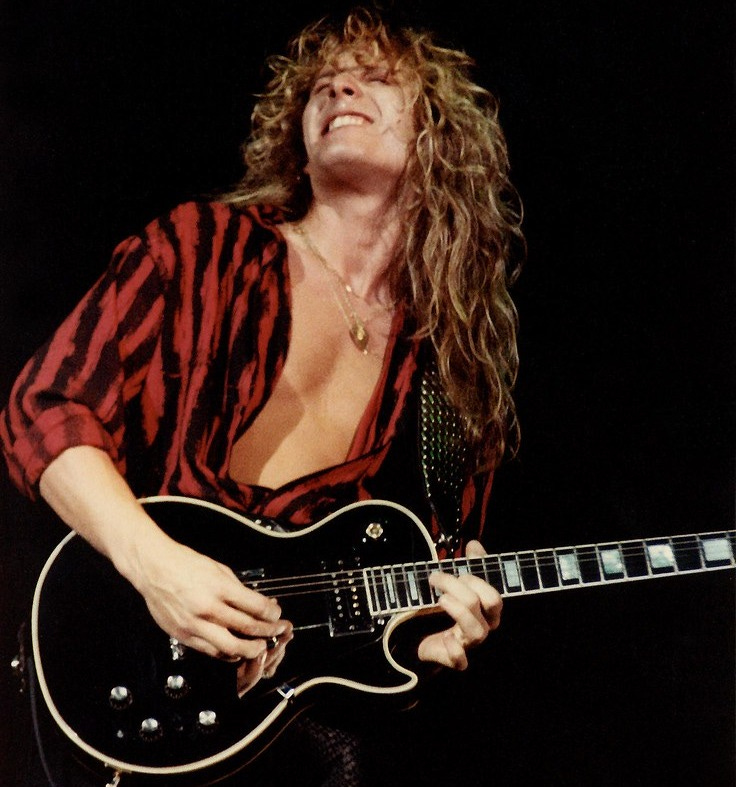
John Sykes would make an equally fascinating case study. The death of Sykes prompted emotional tributes and by-numbers obituaries (Guardian, Telegraph),6 but the most revealing portraits emerged in videos posted by his associates on YouTube. Broadcaster Eddie Trunk, producer Michael Nielsen and bandmate Carmine Appice describe a brilliant musician and a sometimes difficult, wilful and introverted man.7
Sykes’ dramatic arc is cinematic and ultimately tragic. The NWOBHM apprenticeship, rise to prominence with Thin Lizzy, rock stardom with Whitesnake; the great betrayal by Coverdale and the car chase through Los Angeles;8 disappointment, bitterness, depression;9 the intermittent returns to action with Blue Murder, a resurrected Lizzy and as a solo artist; the abandoned projects and shelved recordings; retreat, illness, death. How we cried when he was fallen! No last hurrah for the leonine demigod but, like those who have gone before, Sykes’ immortality is assured on the sonic plane. Guitar heroes never really die.
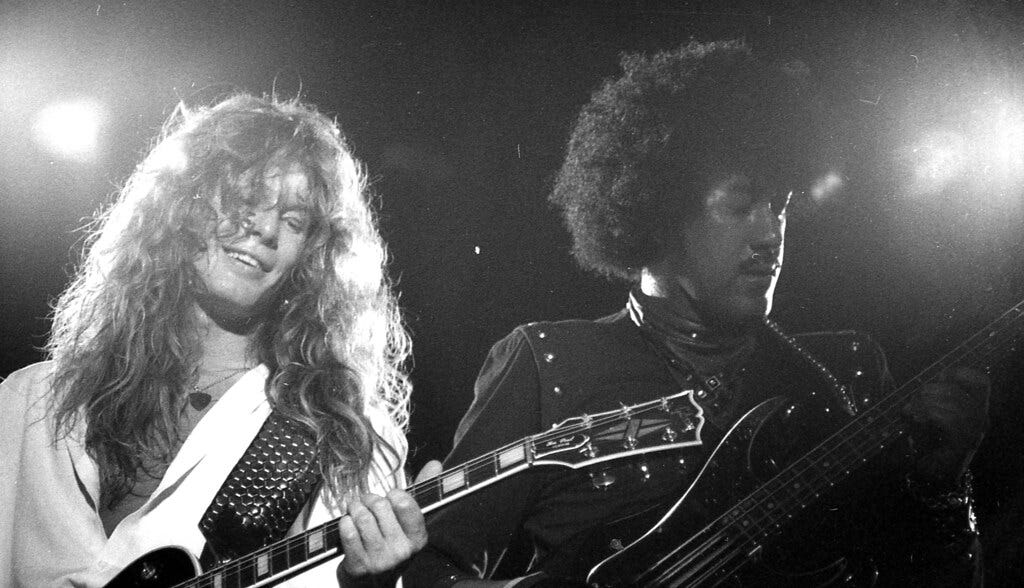
See also: Ascending to the Hall of Heroes
Dave Ling, interview with Mick Box and Bernie Shaw of Uriah Heep, Classic Rock 337 (March 2025), 90-91 (also online here). The counter to this, as keyboardist Don Airey has pointed out in an interview with Rock n Roll Grad School, is that untutored guitarists with no knowledge of music theory don’t know what they are doing: ‘Now guitar players are very strange people; they’re very insecure. The more talented they are, the more eccentric and unsure of themselves, ‘cause they don’t really know how they do what they do… When you’re a keyboard player, you do know how you do it, so you’ve just gotta take charge of the situation, to a certain extent, without letting the guitar player know and just make him feel comfortable.’ But Airey is well aware of the fundamental importance of the guitar, even in the hands of the unschooled musician: ‘The secret of rock 'n' roll is the guitar. I don't try to be a guitarist on the Minimoog. No matter how hard you try with keyboards, you're not going to get close to the beauty of the sound of Eddie Van Halen, John Sykes or Gary Moore. I've been with these people and I know there's a certain limit to electronic keyboards past which you cannot go. They're simply not that expressive’ (Music Technology (Feb. 1988), 40-43).
Amit Sharma, interview with Dylan Gers, Guitar World (August 2025).
James Rotondi, ‘Mistreated: Will Ritchie Blackmore Ever Get His Due?’, Guitar Player (Dec. 1996), 69-76 & 128. Republished online on the occasion of Blackmore’s 80th birthday in April 2025.
Jas Albrecht, interview with Michael Schenker, Guitar Player 173 (May 1984), 12-26 (republished online in 2025). Others have railed against the guitar hero label. Martin Barre has stated: ‘I am not and never will be a guitar hero. Not in this house, not in my world. It’s a concept I don’t understand. I love playing guitar. I love guitars. I love amps I love sounds. I love music. But that concept doesn’t touch me…. Being a guitar wizard or guitar hero is for other people.’ His fans think otherwise.
The obit in Guitarist 522 (April 2025), 46-47 is a poor effort for a dedicated guitar mag. Much better is the obit and analysis by Pete Prown and Oscar Jordan in Vintage Guitar (April 2025), 56-60, and Dave Ling’s piece in Classic Rock 338 (April 20025), 22-25. The best tribute to Sykes is the dedicated issue of Young Guitar (April 2025 issue).
See also Marco Mendoza’s nuanced comments about Sykes’ personality (interview with Alma Hard recorded shortly before Sykes’ death).
Malcolm Dome, interview with John Sykes, Rock Candy 2 (June-July 2017), 36-39.
On Sykes’ bouts of depression, note the comments of Tony Franklin and Carmine Appice in interviews with Full In Bloom. Sykes stated that he ‘was devastated’ at being fired from Whitesnake. ‘The 1987 album took two years to make, I worked really hard on it and wanted to see the project through… What I learnt is that you can’t trust anyone you work for, you have to be your own boss’ (Howard Johnson, interview with John Sykes, Kerrang 236 (April 1989), 28-32). When Sykes failed as his own boss with Blue Murder, it was a bitter blow. Carmine Appice recounts: ‘My instinctive reaction to a disappointment like that [i.e. the underperformance of BM’s debut album compared to the mega-seller 1987, which featured seven songs co-written by Sykes] is always to regroup, make another record, and try again, but John Sykes took it hard, probably because he was following a hit as huge as Whitesnake. He got depressed and just stopped returning calls from the rest of us about what was happening next. Eventually we all just got frustrated and drifted away from the band’ (C. Appice & I. Gittins, Stick It! (Chicago 2016), 201).


